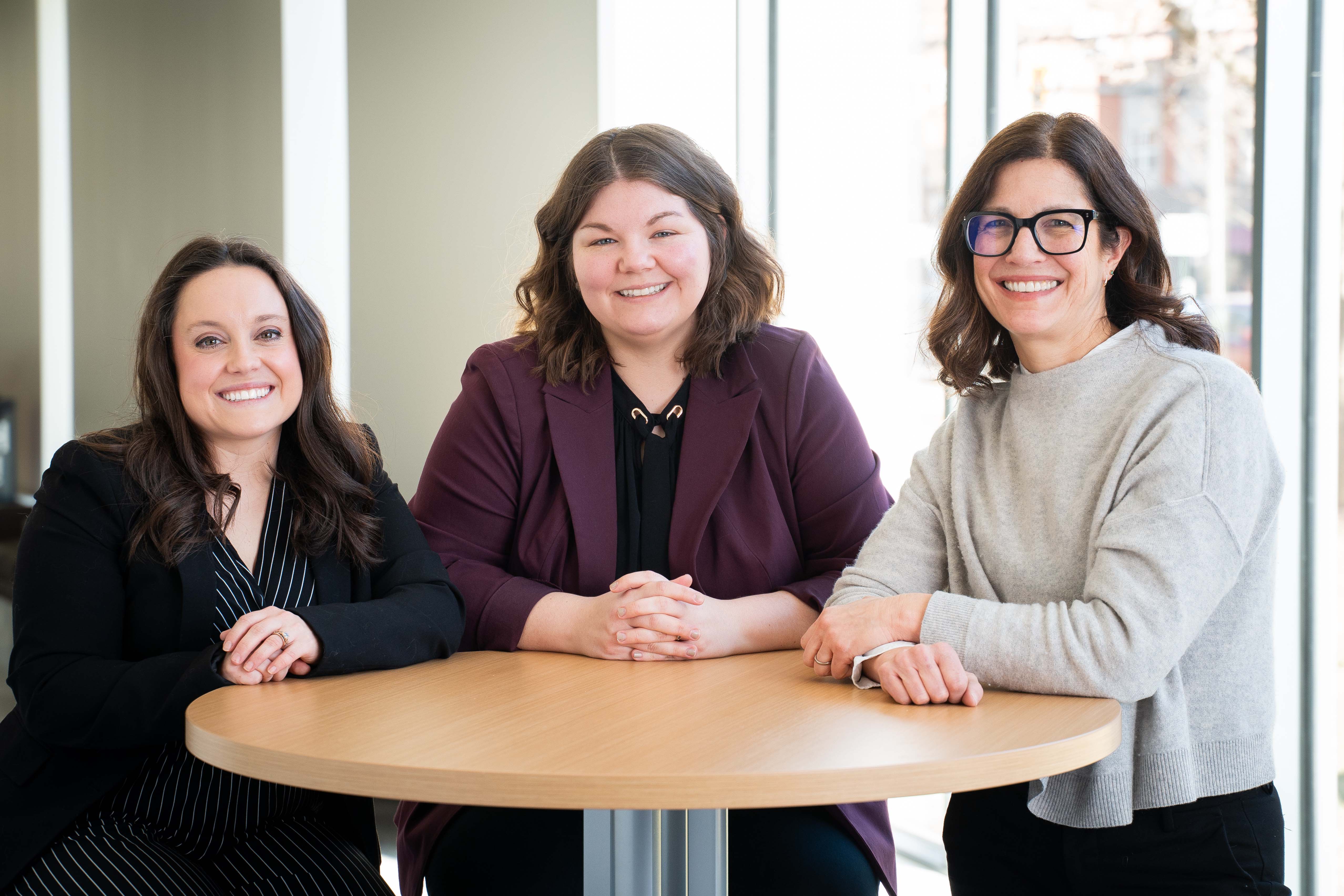
Empowering Parents
by Victoria Ellwood
When it comes to helping children, our researchers involve the whole family
“Seeing how powerful parents can be in the life of a child has driven me to my research,” said Susie Breitenstein, PhD, RN, FNAP, FAAN, senior associate dean for research and innovation. She and other researchers at the Martha S. Pitzer Center for Women, Children and Youth are developing and testing interventions to support parents who face challenging situations. They embrace three key principles: honoring parents’ expertise, involving the whole family in caregiving strategies and interventions, and empowering parents to be part of their children’s success.
“Parents know their child best, and we value that expertise. We look to them to know how their child will respond to new strategies. We honor parents as the change agents in supporting child and adolescent social and behavioral health,” Breitenstein said.
Three current research studies within the college exemplify this family-focused approach.

Kayla Herbell: Helping families of children in residential treatment
Each year in the United States, 50,000 youth with serious behavioral and emotional health challenges are admitted to residential treatment facilities, where average stays are around eight months. After being released, more than 80% of these young people fail to adjust to the “real world” and are readmitted, incarcerated or homeless.
Kayla Herbell, PhD, RN, is researching ways to change those statistics with a program that gives parents tools to help their child reintegrate and readjust to coming home.
“Early in my career I worked as a nurse in residential treatment in Cleveland,” she said. There, youth stayed in a locked, highly controlled and sterile environment, where they received 24/7 treatment, therapy and skills-building. “We’d see kids in our care who improved and were released, and we’d think they were on a better path. But like clockwork they would be back, often worse off than before.”
She explained that there were no programs to help families help their child readjust. “Kids were learning skills, but parents were left out in the cold. That is a huge gap, and that’s where my research is rooted – creating programs for families, in partnership with families.”
A needs assessment found parents needed behavior management skills and a way to feel less isolated and less ostracized. Herbell added a group component to an existing web-based program called Parenting Wisely. “Parents liked the Parenting Wisely program, but they still felt alone. The added component allows small groups of parents to come together in virtual discussion groups, talk about their experiences and navigate challenges together,” she said.
“Parents know their child best, and we value that expertise. We look to them to know how their child will respond to new strategies. We honor parents as the change agents in supporting child and adolescent social and behavioral health.”
– Susie Breitenstein, PhD, RN
Her program, called Families in Transition (FIT), is currently being evaluated in a National Institute of Mental Health-funded study. FIT focuses on families with 11- to 17-year-old adolescents in residential treatment. Twenty families are enrolled in the project, which launched in August 2023.
“After watching the training modules, parents participate in the group setting led by a facilitator where they can talk about shared experiences and recommend solutions. The groups are able to provide real, tangible advice to one another.”
Herbell is already seeing very positive feedback. “One mother put it this way, ‘People always give their two cents about my kid, and sometimes I feel like I’m talking to a hairstylist about a car problem. You all get what we’re going through; you’re all mechanics.’ ”
Samantha Ault: Support for rural families of children with autism
When a child is diagnosed with autism, “the emotional struggle families face is enormous,” said Samantha Ault, PhD, APRN-CNP, PMHNP-BC (’17 MS, ’21 PhD). Her research focuses on support for rural families of autistic children.
Family interventions are important, not just for the child’s well-being, but for everyone in the family. It’s even more crucial in rural areas, where there’s a huge disparity in diagnostic options, treatment and resources. “When I first graduated with a degree in psychology, I worked at Nationwide Children’s Hospital in Columbus in the autism area, but only with urban and suburban families. When I became a nurse-practitioner and moved back to my hometown in Appalachian Ohio, I realized most kids with autism were not diagnosed, never referred for testing and had no means to get specialized therapies.”
So Ault earned her PhD with the aim to find interventions that could help. “That’s what led me to my research to get families services they desperately need.”
Her research project focuses on a web-based parent training program called Attend Behavior, which until now has not been rigorously researched in rural populations. Attend Behavior is readily accessible to parents via an app on their phone or computer and consists of 12 learning modules.
“This web-based, self-paced program includes educational sessions that range from tracking behavior, skill development, daily living skills, safety, teaching independence, handling challenges and so on,” said Ault, who is testing it with rural families throughout Ohio. “While we don’t have survey statistics yet, we’re finding that parents like the online program and how it fits with their schedules. They’re grateful because there is nothing like it in their rural area. Their child has been diagnosed, but they are not offered much help or support because of where they live.”
The program also helps parents feel less isolated, Ault said. “I interviewed one mom who was surprised to learn from the modules that other parents were dealing with the same things she was. She had never connected with other parents who had kids like hers in her rural community and felt a ton of relief she wasn’t the only parent dealing with behaviors discussed in the module. It made her feel much less alone.”
Susie Breitenstein: When premature infants become toddlers
Breitenstein’s NIH-funded project focuses on testing a web-based parenting program and boosting its effectiveness with the addition of individual telephone coaching sessions and parenting groups. The study is geared to parents of toddlers who had been born very premature.
“These children have a higher risk of neuro-developmental challenges and behavioral problems,” Breitenstein said. “There are plenty of resources to help with a child’s physical development, such as language and motor skills, but less support to help parents build their own skills to support and improve their child’s behavior.”
The study builds on previous research with a parent-training program called ezParent, the web-based delivery of the Chicago Parent Program, and adds an extra layer of personal, one-on-one and group touch-points.
The program consists of six self-guided, online training modules, each built on a different set of parenting skills. The lessons include training videos, reflection questions, activities and a multitude of skills for parents to use. Breitenstein is testing the program across several projects using hybrid delivery of the ezParent program with the addition of 10 weeks of telephone coaching sessions or a series of virtual group discussions facilitated by a trained leader.
“Hybrid methods help with accountability of completing a web-based program and give parents an opportunity to discuss tailoring strategies for their families. In the groups, there’s a universality that develops among parents. Being able to make connections, share ideas and realize other parents are experiencing the same things with their toddlers are powerful mechanisms.”
With positive uptake so far, Breitenstein hopes these hybrid models will prove to be effective in supporting parent behavior and ultimately improving child behavior. Her goal is to package the models for broad use. “I’d love to see a widely accessible bundle that can easily be accessed by parents everywhere.”
Breitenstein added, “I believe that every parent wants to be a good parent ... but sometimes challenges get in the way or sometimes parents just don’t have the right tools.” Parent training programs like these are hoping to change that.
Breitenstein, Herbell and Ault are part of the Parenting Research Collaborative, a group of researchers from The Ohio State University, Nationwide Children’s Hospital and University of Cincinnati. Led by Herbell, the group consists of interdisciplinary researchers from all career stages who are engaged in family-focused research.

In this Issue
- Empowering Parents
- Small Town, Big Impact
- Take HEED!
- “She was my nurse!”
- Filling Ohio’s Workforce Needs
- Grants Roundup
- Sparking Innovation
- Of Science and Service
- Becoming Global Citizens
- Camping with Emily Gee
- Alumni in Action: Shining a Light
- From Farm Girl to Rural NP
- Meet Kristen Hill
- Move Your Way to Better Health



